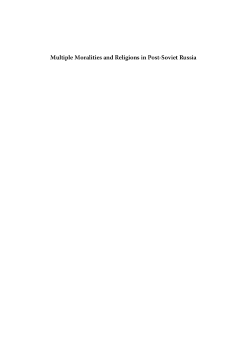
Additional Information
Book Details
Abstract
In the post-Soviet period morality became a debatable concept, open to a multitude of expressions and performances. From Russian Orthodoxy to Islam, from shamanism to Protestantism, religions of various kinds provided some of the first possible alternative moral discourses and practices after the end of the Soviet system. This influence remains strong today. Within the Russian context, religion and morality intersect in such social domains as the relief of social suffering, the interpretation of history, the construction and reconstruction of traditions, individual and social health, and business practices. The influence of religion is also apparent in the way in which the Russian Orthodox Church increasingly acts as the moral voice of the government. The wide-ranging topics in this ethnographically based volume show the broad religious influence on both discursive and everyday moralities. The contributors reveal that although religion is a significant aspect of the various assemblages of morality, much like in other parts of the world, religion in postsocialist Russia cannot be separated from the political or economic or transnational institutional aspects of morality.
“In this volume, the discussion of multiple moralities, religions and secularisms is put forth by multiple voices of researchers as well…representing different levels of ethnographic intimacy and theoretical engagement. While this disparity could end up as a flaw, as often happens with edited volumes, in this case it complements well the complexity of the moral worlds of informants and heterogeneity of local moral discourses … This volume also enriches the study of secularism, religion and morality in post-Soviet studies and beyond.” · Social Analysis
“This innovative book with high academic standards combines anthropologists’growing interest in studying morality with a special focus on the anthropology of religion, both situated in the context of post-Soviet Russia.” · Slavic Review
“This collection includes an impressive roster of contributors in order to offer a multitude of analyses that specifically address the relationship between morality and religion in post-Soviet Russia…As a whole, this volume unquestionably enriches the contemporary understanding of post-Soviet Russia. It also adds to a growing concern with the articulation of a contemporary anthropology of morality.” · Journal of Contemporary Religion
“…the essays in this collection perform two valuable functions—first, to alert anthropologists to the importance and multiplicity (that is, diversity and relativism) of moralities, and second, to inform us of the extensive literature and achievements on the anthropology of Russian religion and morality.” · Anthropology Review Database
“One of the volume’s notable contributions is that it brings together ethnographies on religious groups that have so far been underrepresented in English-language ethnographies… the collection as a whole points beyond its declared theoretical framework, which is certainly an achievement.” · Anthropos
“…a strong volume that provides an excellent overview of the moral breakdown and re-constitution in Russia. It is a valuable contribution to the fast growing body of English-language volumes that study different aspect of religion and morality in the former Soviet Union. In addition, it is one of the few English-language volumes on the Orthodox Church.” · Mathijs Pelkmans, London School of Economics
Jarrett Zigon is an Assistant Professor in the Department of Anthropology at the University of Amsterdam. He is the author of Morality: An Anthropological Perspective (2008), Making the New Post-Soviet Person: Moral Experience in Contemporary Moscow (2010), and HIV is God’s Blessing: Rehabilitating Morality in Neoliberal Russia (2011). His articles can be found in Anthropological Theory, Ethnos, and Ethos among other journals.
